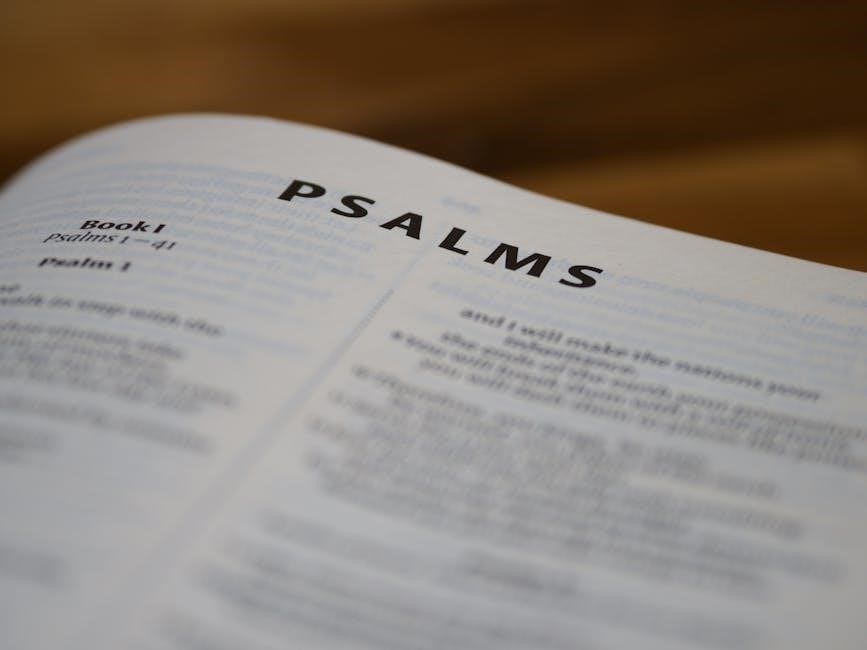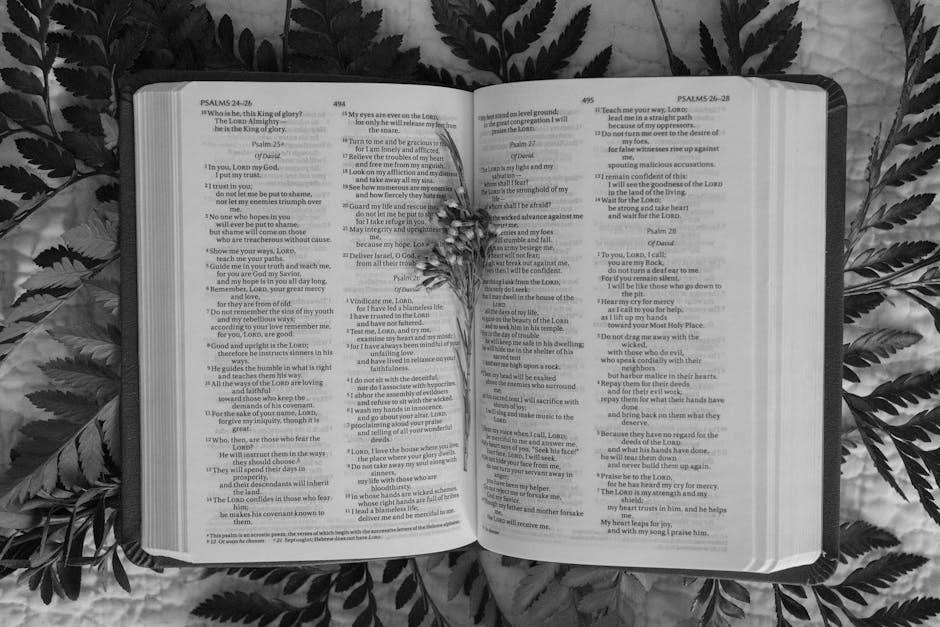1.1 Overview of Psalms PDF
One notable feature of the Psalms PDF is its organizational structure, which often categorizes the psalms into themes or sections for easier navigation. For example, some versions group psalms based on phrases from the Lord’s Prayer, providing a thematic approach to understanding the text. This categorization helps readers identify psalms that align with specific spiritual needs or biblical teachings. Additionally, many Psalms PDFs include introductory notes, commentaries, or study guides, enhancing the reader’s ability to interpret and apply the psalms in their personal or communal worship.
The availability of Psalms PDFs has been further enriched by contributions from scholars and religious organizations. For instance, resources like Artur Weiser’s commentary on the psalms, published in 1962, are often included in these digital editions, offering deeper insights into the historical and theological context of the text. Similarly, historical versions, such as the Bay Psalm Book from 1640, are sometimes featured in these PDFs, allowing readers to explore earlier translations and interpretations of the psalms.
The Psalms PDF is not only a practical tool for personal devotion but also a valuable resource for educational and liturgical purposes. Many churches and religious groups use these files to prepare worship materials, Bible study outlines, and prayer guides. Furthermore, the digital format makes it easy to share the Psalms PDF with others, facilitating communal study and reflection.
1.2 Significance of Studying Psalms
Studying the Psalms holds profound significance for individuals seeking spiritual growth, theological understanding, and emotional connection with divine wisdom. The Psalms, often referred to as the “Psalter,” are a collection of poetic prayers and songs that have served as the foundation of Jewish and Christian worship for centuries. Their timeless relevance lies in their ability to express the full spectrum of human emotions, from joy and gratitude to sorrow and repentance, while offering guidance for navigating life’s challenges.
One of the most compelling reasons to study the Psalms is their universal appeal. They address experiences common to all people, regardless of cultural or historical context, making them a relatable and enduring source of comfort and inspiration. For instance, Psalm 91 offers assurances of divine protection, while Psalm 23 provides solace in times of uncertainty. These writings resonate deeply with readers, fostering a sense of connection to both the divine and the broader human experience.
The Psalms also serve as a rich resource for theological reflection. They contain profound insights into the nature of God, humanity, and the world, making them invaluable for deepening one’s faith. Many psalms express trust in God’s sovereignty, even in the face of adversity, offering lessons in faith, hope, and perseverance. This theological depth is further enriched by the historical and cultural contexts in which the psalms were written, providing a window into the spiritual practices and beliefs of ancient Israel.
Moreover, the Psalms are a vital part of liturgical traditions. In both Jewish and Christian worship, they have been sung, recited, and prayed for millennia, forming the backbone of communal and individual devotion. Studying the Psalms allows participants in these traditions to engage more meaningfully with their liturgical heritage, enhancing their worship experience. Additionally, the Psalms’ lyrical nature makes them a powerful tool for personal reflection and meditation, helping individuals cultivate intimacy with God.
In a world where many feel disconnected from spiritual traditions, the Psalms offer a way to renew and refresh one’s faith. They provide language and symbolism that can help modern believers articulate their own spiritual journeys, even in unfamiliar or challenging circumstances. Their enduring relevance is a testament to their divine inspiration and timeless wisdom.

Historical Background
The Psalms, the 19th book of the Old Testament, are deeply rooted in ancient Israel’s worship and culture. Traditionally ascribed to King David, these poetic compositions reflect the spiritual journey of Israel over centuries. The earliest psalms date back to the time of King David, while others were written during periods of exile and restoration. The Psalms have been a cornerstone of Jewish and Christian liturgy, with historical editions like the 1640 Bay Psalm Book marking significant milestones in their dissemination. Their rich history underscores their enduring influence on faith and worship.
2.1 Composition History of the Psalms
The Psalms, a collection of sacred poems and hymns, were composed over a span of several centuries, reflecting the spiritual and historical journey of ancient Israel. The earliest psalms are believed to have been written during the time of King David (c. 1000 BCE), while others were composed much later, including during the Babylonian exile (586–538 BCE) and the post-exilic period. This gradual accumulation of psalms indicates a dynamic process of creation and compilation, with contributions from various authors and editors.
King David is traditionally credited with authoring at least 73 of the 150 psalms, earning him the title of Israel’s “sweet psalmist of Israel” (2 Samuel 23:1). However, other contributors, such as Asaph, the sons of Korah, and Solomon, also played significant roles in shaping the Psalter. Some psalms are attributed to anonymous authors, adding to the diversity of voices within the collection. These compositions were not written in isolation but were deeply rooted in Israel’s history, culture, and faith, often reflecting personal and communal experiences of joy, lament, thanksgiving, and wisdom.
The Psalms are divided into five books, a structure that mirrors the five books of Moses (the Torah). This division likely reflects the process of compilation and editing that occurred over time. The first book (Psalms 1–41) includes many of David’s psalms, while the second book (Psalms 42–72) contains works attributed to the sons of Korah and Asaph. The third book (Psalms 73–89) includes historical reflections, and the fourth book (Psalms 90–106) emphasizes God’s covenant faithfulness. The fifth book (Psalms 107–150) concludes with praise and celebration, including the Hallel Psalms (113–118), which were likely used in Jewish festivals.

The final compilation of the Psalms into their current form likely occurred after the Babylonian exile, as the Jewish community sought to preserve their sacred traditions. This process involved selecting, arranging, and editing existing psalms to create a cohesive collection that would serve as a prayer book for Israel. The result is a rich tapestry of poetry and prayer that continues to resonate with people of faith today. The composition history of the Psalms underscores their enduring relevance as a spiritual and liturgical resource.

2.2 Key Authors and Their Contributions
The Psalms are attributed to several key authors whose contributions have shaped the theological and emotional depth of this sacred collection. King David, often referred to as the “sweet psalmist of Israel,” is the most prominent author, credited with writing at least 73 of the 150 psalms. His compositions span a wide range of emotions, from deep repentance and sorrow to joyous praise and trust in God. Many of David’s psalms are linked to significant events in his life, such as his victory over Goliath or his exile during the reign of King Saul. His works are characterized by their personal and intimate nature, making them universally relatable.
Another significant contributor is Asaph, a Levite and a leader of worship in Israel. Asaph is credited with writing 12 psalms, many of which focus on the history of Israel and the corporate experiences of God’s people. His psalms often express a sense of communal lament and hope, reflecting the trials and triumphs of the nation. Asaph’s contributions emphasize the importance of remembrance and faithfulness in the face of adversity.
The sons of Korah, a group of Levitical singers and composers, are attributed to 11 psalms. Their compositions are known for their lyrical beauty and themes of trust in God. Psalms like Psalm 46 and Psalm 48 reflect their emphasis on divine sovereignty and the security of those who place their hope in God. The sons of Korah’s psalms often serve as expressions of communal worship, celebrating God’s presence and deliverance.
Solomon, the son of David and a wise king of Israel, is traditionally credited with writing Psalm 72 and possibly others. His contributions bring a wisdom-oriented perspective, focusing on themes of justice, righteousness, and the reign of God. Solomon’s psalms reflect his deep understanding of human nature and the divine order of creation.

In addition to these named authors, many psalms remain anonymous, adding to the diversity of voices within the Psalter. These unnamed contributors enrich the collection with their unique perspectives, making the Psalms a comprehensive and inclusive expression of human spirituality.

The contributions of these key authors highlight the Psalms’ dynamic and evolving nature, reflecting the spiritual journeys of individuals and communities across generations. Their works continue to inspire and guide people in worship, prayer, and personal devotion, as seen in the Psalms PDF available for study and reflection today.

Types of Psalms
The Book of Psalms is a diverse collection of sacred poetry, encompassing a wide range of themes, emotions, and literary styles. These compositions can be categorized into various types, each reflecting unique characteristics and purposes. Understanding these categories provides deeper insight into the spiritual and theological richness of the Psalms.
One of the most common types is the Psalms of Praise, which express adoration and thanksgiving to God. These psalms often celebrate God’s creation, providence, and redemptive acts. For example, Psalm 100 is a classic example of a praise psalm, urging worshippers to “make a joyful noise” and acknowledge God’s faithfulness. These psalms are foundational in both corporate and individual worship, fostering a sense of awe and gratitude.
Another prevalent category is the Psalms of Lament, which voice sorrow, repentance, and cries for help. These psalms often reflect personal or communal suffering, seeking divine intervention and comfort; Psalm 51, a penitential prayer, exemplifies this type, as it expresses deep remorse for sin and a plea for forgiveness. Laments remind believers that even in darkness, God is near and hears the cries of the brokenhearted.
The Psalms of Thanksgiving are closely related to praise but focus specifically on expressing gratitude for God’s deliverance or blessings. Psalm 30, for instance, reflects David’s thanksgiving for being rescued from adversity, emphasizing trust in God’s steadfast love. These psalms serve as testimonies of God’s faithfulness and encourage believers to recount His goodness.

Wisdom Psalms, such as Psalm 37, offer practical advice and insights into living a virtuous life. These psalms blend theological reflections with moral guidance, often contrasting the paths of the righteous and the wicked. They encourage believers to trust in God’s justice and cultivate a life of integrity.
Royal Psalms, like Psalm 2, focus on the reign of God and the role of Israel’s kings as His representatives. These psalms highlight the divine authority vested in human leaders and often foreshadow the coming Messiah, who would reign as the ultimate King of Zion.

Prophetic Psalms, such as Psalm 22, contain elements of prophecy and foresight, pointing to future events and the messianic hope. These psalms often blend worship with anticipations of redemption, serving as a bridge between present suffering and future glory.
Pilgrimage Psalms, like Psalm 120-134, were sung by travelers journeying to Jerusalem for sacred festivals. These psalms reflect themes of pilgrimage, trust, and unity among worshippers, emphasizing the joy of communal worship.
Lastly, Imprecatory Psalms, such as Psalm 69, contain prayers for judgment or vengeance against enemies. While controversial, these psalms reveal the raw emotions of the psalmists and underscore the need for divine justice in a fallen world.

Together, these types of psalms create a rich tapestry of human experience and divine interaction, making the Psalter a timeless resource for worship, reflection, and spiritual growth. The Psalms PDF provides easy access to these compositions, enabling readers to explore their depths and apply their truths to everyday life.
